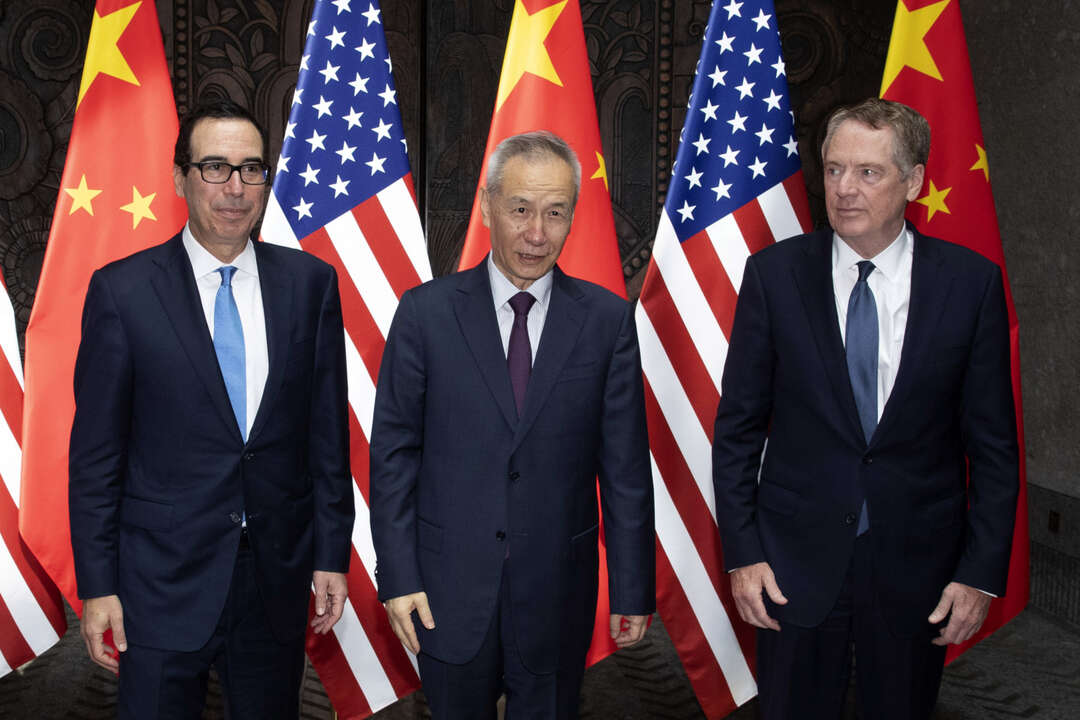-
Latest U.S.-China trade talks called 'constructive' by both sides

The first face-to-face talks since a ceasefire was agreed to last month in the trade war between the world’s two largest economies amounted to a working dinner on Tuesday at Shanghai’s historic Fairmont Peace Hotel and a half-day meeting on Wednesday, before U.S. Trade Representative Robert Lighthizer and Treasury Secretary Steven Mnuchin flew out.
“The meetings were constructive, and we expect negotiations on an enforceable trade deal to continue in Washington ... in early September,” White House spokeswoman Stephanie Grisham said in a statement.
“Both sides, according to the consensus reached by the two leaders in Osaka, had a candid, highly effective, constructive and deep exchange on major trade and economic issues of mutual interest,” China’s Commerce Ministry said in a statement shortly after the U.S. team left Shanghai.
It was not immediately clear what, if any, further agricultural products China agreed to buy from the United States and when - an issue that had become a bone of contention after U.S. President Donald Trump said China had not made good on promised purchases.
“The Chinese side confirmed their commitment to increase purchases of United States agricultural exports,” the White House’s Grisham said, offering no other details.
Representatives for the U.S. Trade Representative’s office did not immediately respond to a request for comment.
The Chinese statement said negotiators discussed more Chinese purchases of agricultural products from the United States, but did not say there was any agreement to buy more.
The talks began amid low expectations. Trump on Tuesday warned China against waiting out his first term to finalise any trade deal, saying if he wins re-election in the November 2020 U.S. presidential contest, the outcome will be worse for China.
Fresh fears over the trade war and concerns about a protracted fight with little near-term progress weighed on global markets on Wednesday.
Chinese Foreign Ministry spokeswoman Hua Chunying said on Wednesday that she was not aware of the latest developments during the talks, but that it was clear it was the United States that continued to “flip flop”.
“I believe it doesn’t make any sense for the U.S. to exercise its campaign of maximum pressure at this time,” Hua told a news briefing in response to a question about the tweets.
“It’s pointless to tell others to take medication when you’re the one who is sick,” she said.
EARLY FINISH
The U.S.-China trade war has disrupted global supply chains and shaken financial markets as each side has slapped tariffs on billions of dollars of each other’s goods.
An official Chinese government survey released on Wednesday showed factory activity shrank for the third month in a row in July, underlining the growing strains the dispute has placed on the No. 2 economy.
The Shanghai talks were expected to centre on “goodwill” gestures, such as Chinese commitments to purchase U.S. agricultural commodities and steps by the United States to ease some sanctions on Chinese telecoms equipment giant Huawei Technologies Co Ltd ,a person familiar with the discussions told Reuters earlier.
Those issues are somewhat removed from the primary U.S. complaints in the trade dispute such as Chinese state subsidies, forced technology transfers and intellectual property violations - all topics the White House in its statement said were discussed. China’s account of the discussions did not mention any of the non-agricultural issues.
Trump and Chinese President Xi Jinping agreed in June at the G20 summit in Osaka, Japan, to restart trade talks that stalled in May, after Washington accused Beijing of reneging on major portions of a draft agreement. The collapse in talks prompted a steep U.S. tariff hike on $200 billion of Chinese goods.
The U.S. Commerce Department put Huawei on a national security blacklist in May, effectively banning U.S. firms from selling to Huawei, a move that enraged Chinese officials.
Trump said after the Osaka meeting that he would not impose new tariffs on a final $300 billion (245.4 billion pounds) of Chinese imports and would ease some U.S. restrictions on Huawei if China agreed to make purchases of U.S. agricultural products.
But so far, U.S. semiconductor and software makers are still mostly in the dark about the administration’s plans.
In Sao Paulo on Tuesday, U.S. Commerce Secretary Wilbur Ross said decisions on license applications by U.S. firms to resume some sales to Huawei could come as early as next week.
Hu Xijin, editor-in-chief of China’s nationalistic Global Times tabloid, run by the ruling Communist Party’s People’s Daily newspaper, wrote on Twitter that the negotiators had “efficient and constructive” exchanges.
“The two sides discussed increasing purchase of U.S. farm products and the U.S. side agreed to create favourable conditions for it. They will hold future talks,” Hu said, without elaborating.
Tags
You May Also Like
Popular Posts
Caricature
BENEFIT Sponsors BuildHer...
- April 23, 2025
BENEFIT, the Kingdom’s innovator and leading company in Fintech and electronic financial transactions service, has sponsored the BuildHer CityHack 2025 Hackathon, a two-day event spearheaded by the College of Engineering and Technology at the Royal University for Women (RUW).
Aimed at secondary school students, the event brought together a distinguished group of academic professionals and technology experts to mentor and inspire young participants.
More than 100 high school students from across the Kingdom of Bahrain took part in the hackathon, which featured an intensive programme of training workshops and hands-on sessions. These activities were tailored to enhance participants’ critical thinking, collaborative problem-solving, and team-building capabilities, while also encouraging the development of practical and sustainable solutions to contemporary challenges using modern technological tools.
BENEFIT’s Chief Executive Mr. Abdulwahed AlJanahi, commented: “Our support for this educational hackathon reflects our long-term strategic vision to nurture the talents of emerging national youth and empower the next generation of accomplished female leaders in technology. By fostering creativity and innovation, we aim to contribute meaningfully to Bahrain’s comprehensive development goals and align with the aspirations outlined in the Kingdom’s Vision 2030—an ambition in which BENEFIT plays a central role.”
Professor Riyadh Yousif Hamzah, President of the Royal University for Women, commented: “This initiative reflects our commitment to advancing women in STEM fields. We're cultivating a generation of creative, solution-driven female leaders who will drive national development. Our partnership with BENEFIT exemplifies the powerful synergy between academia and private sector in supporting educational innovation.”
Hanan Abdulla Hasan, Senior Manager, PR & Communication at BENEFIT, said: “We are honoured to collaborate with RUW in supporting this remarkable technology-focused event. It highlights our commitment to social responsibility, and our ongoing efforts to enhance the digital and innovation capabilities of young Bahraini women and foster their ability to harness technological tools in the service of a smarter, more sustainable future.”
For his part, Dr. Humam ElAgha, Acting Dean of the College of Engineering and Technology at the University, said: “BuildHer CityHack 2025 embodies our hands-on approach to education. By tackling real-world problems through creative thinking and sustainable solutions, we're preparing women to thrive in the knowledge economy – a cornerstone of the University's vision.”
opinion
Report
ads
Newsletter
Subscribe to our mailing list to get the new updates!






















